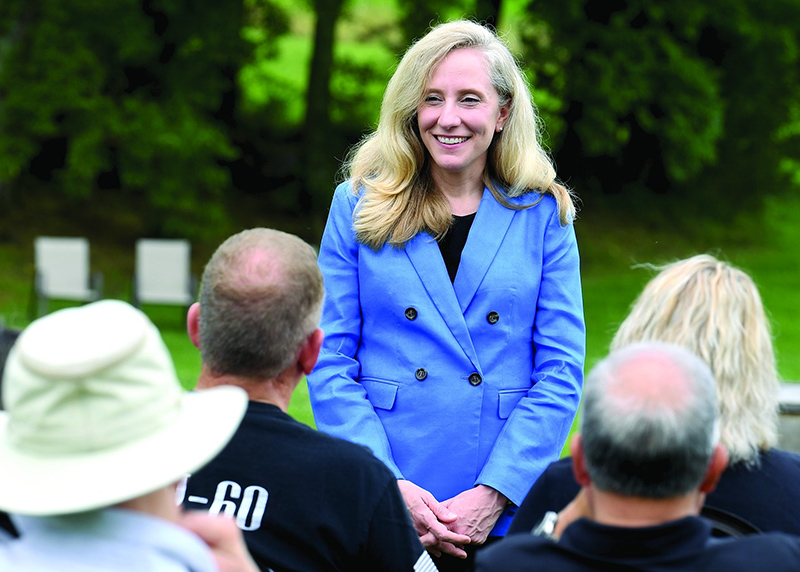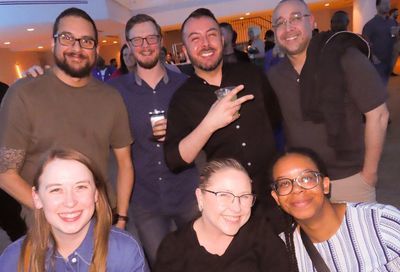LGBTQ Lawmakers: What happens after the “Rainbow Wave”?
Out LGBTQ officials, including newly-elected ones, talk about their priorities and balancing the needs of their districts

“Every time I’ve run for a different office, I’ve always been told I couldn’t win,” says State Senator-Elect Nickie Antonio of Ohio. “This time was no exception.
“In fact, people told me: ‘I know you won those other races, but you are never going to to win because your opponent is a heterosexual male with a sports background, a former president of the City Council of Cleveland, has a lot of friends, and has many people who are afraid of him.’ There were even rumors that he wanted the seat to set himself up to run for Mayor of the City of Cleveland in 2019, and he’d have a safe spot if he didn’t make it,” explains Antonio, the State House Minority Whip who calls the 2018 Democratic primary for State Senate “the toughest race I’ve ever had” over her 13-year political career.
“That was outrageous to me, this idea of entitlement and privilege,” she says. “I was bothered by it, because in all of the preliminary conversations about running for the seat, I was the one talking about the people, what we needed to be doing in the legislature.”
Despite the Democratic Party throwing its endorsement behind her opponent, Antonio refused to step aside. She eventually won the primary by 10 points, and won the general election after no Republican filed to run. She will now be the first openly LGBTQ person to serve in the State Senate, less than a decade after making history as the first openly LGBTQ person to serve in the State House.
Antonio’s story is quite familiar to a number of first-time LGBTQ office seekers, many of whom attended the LGBTQ Victory Institute’s International LGBTQ Leaders Conference in Washington, D.C. last week.
Held annually, the conference serves as a chance for LGBTQ leaders to congregate, swap stories, and share ideas about how best to organize campaigns, run for elective office, and deliver on promises once elected.
Having LGBTQ people in office exposes voters and fellow lawmakers to out LGBTQ people and shows, through example, that they are qualified to serve. Additionally, familiarity with out lawmakers is believed to make people more sympathetic or open to supporting legislation that improves the lives of LGBTQ people.
Because a majority of LGBTQ people seeking office this year were running as Democrats in a year when the incumbent Republican president is relatively unpopular, the so-called “blue wave” that allowed Democrats to pick up 40 congressional seats and nearly 400 legislative seats helped propel several LGBTQ political newcomers to victory, creating what many left-leaning pundits have termed a “rainbow wave.”
What makes this year’s class of elected officials unique, however, is their diversity, in terms of geography as well as identity. Not only are many of them history-making figures and “firsts,” but several are Democrats who come from Republican-leaning states that lack protections for LGBTQ people. As a result, their influence is amplified as they attempt to balance serving their constituents’ immediate needs and representing the larger LGBTQ community.
Since joining the Ohio House eight years ago, Antonio has introduced a bill that would protect LGBTQ people from discrimination at the start of each two-year legislative term. She has also focused on issues such as women’s rights, school funding issues, and efforts to help Northeast Ohio as it transitions from a manufacturing-based economy to one centered around health care and information technology.
“I keep telling my colleagues that voting for LGBTQ civil rights and equality is the best business move we can make,” she says. “It’s an economic decision and economic driver that helps bring the best and brightest and attracts companies that already have those policies and values.”
Despite the bill being blocked by the Republican-led legislature, Antonio believes there is a political path to pass a nondiscrimination law — and that there is wider support for such a measure than there may appear to be.
“Around 20 communities, large and small, throughout Ohio have passed local nondiscrimination policies or bans on conversion therapy,” she notes. “And the the communities that have been able to do that may not necessarily have a large number of LGBTQ folks, but a coalition of allies and progressive-minded people who want to see their community being accepting and open.”
She also notes that she’s seen a generational change in which younger Republicans are more supportive of LGBTQ rights, but the GOP as a whole is still trying to figure out how far they can go in support of LGBTQ-related legislation without incurring a backlash from their base.
Like many Democrats in heavily Republican states, Antonio warns the national party not to “write off” states like Ohio as unwinnable when it comes to statewide elections, particularly the 2020 presidential race.
“It makes me sad, because we’re 11.5 million people,” she says. “I think what the party needs to look at is who voted, and who didn’t vote,” she says, noting that Ohio’s Secretary of State has previously been criticized for pushing policies that limit access to voting.
She also encourages Democrats to emulate U.S. Sen. Sherrod Brown (D), who she believes was re-elected because his message of fighting for working people transcends party affiliation and seems to be able to cut through the “noise” and anti-Democratic attacks from right-wing talk radio, Fox News, and third-party monied interests.

It’s a common refrain heard at the conference, particularly for those in states where Democrats have not historically been successful.
“We have to play in every state,” says Georgia State Representative Sam Park (D-Lawrenceville), the first openly gay man and first Asian-American Democrat elected to the state legislature. “If you don’t play in Georgia, you’re definitely not going to win. When it comes to elections, it’s important to continue to invest in these states. We have to build an infrastructure to build on past successes.”
As an example, Park points to Jon Ossoff, a Democrat who ran for Congress in a 2017 special election in Georgia, who came within 4 points of winning a district that has historically favored Republicans. While Ossoff was unable to defeat U.S. Rep. Karen Handel, the inroads his campaign made in the district helped Democrat Lucy McBath unseat Handel in the 2018 general election.
“Reaching out to voters, as well as expanding the electorate, is vitally important, if Democrats want to gain and retain control at a national level,” says Park.
Similarly, Florida State Rep. Carlos Guillermo Smith (D-Orlando) says national Democrats can’t allow themselves to be frustrated by statewide losses in 2018 to the detriment of down-ballot races, where progress is being made more slowly.
“Progressive lawmakers like me have really strengthened our numbers,” notes Smith, who became the first openly LGBTQ Latino lawmaker in the Sunshine State in 2016. “A lot of people focus on the results of the statewide elections. But we picked up a net gain of 5 additional seats in the Florida House, a seat in the State Senate, and flipped two congressional districts. We see more authenticity from progressive lawmakers, and we see more people speaking out in a way we’ve never seen before.”
Both Smith and Park say that LGBTQ advocates need to be careful not to fall into the same trap as national Democrats by failing to have an organized presence on the ground or an infrastructure in place to defeat anti-LGBTQ legislation or pass pro-LGBTQ policies.

“A lot of Democrats are given this choice between being the voice of opposition, and not being able to get any of their bills passed, or moderating their views, being a quiet ‘no’ on the things they oppose, and working with the majority party,” Smith says. “I find that to be a false choice, because in the first two years I was in the House, I was able to get bills passed with bipartisan support.”
Smith points to bipartisan support for the Florida Competitive Workforce Act, the proposed LGBTQ nondiscrimination bill, as an example of how outright hostility toward the LGBTQ community is losing sway, even among conservative voters. He also notes that Florida’s lack of LGBTQ statewide protections was cited as a reason why Amazon’s HQ 2.0 decided not to relocate to the state.
Park, too, notes that the business community was an important ally in convincing outgoing Gov. Nathan Deal (R) to veto a bill that would have given individuals and businesses significant leeway when it comes to discriminating against LGBTQ people and same-sex couples.
“It’s important for businesses to continue to lead in that capacity. We’re talking about cultural change, which the business community helps promote when it stands against hate,” he says, noting that upwards of 90% of Fortune 500 companies already have nondiscrimination policies and LGBTQ protections in place.
That said, Park is quite nervous about the anti-LGBTQ stances that incoming Gov.-elect Brian Kemp embraced on the campaign trail.
“I am very concerned about how the Kemp administration is going to act, whether they’re going to move further to the right, as they campaigned in the general election, or whether he’ll move toward the center, relatively speaking,” says Park. “There’s progress being made, but we still have very conservative legislators in both the House and Senate who would want to pursue anti-LGBTQ proposals.
“The Speaker of the Georgia House is more moderate, and has prevented some anti-LGBTQ legislation from moving forward,” he adds. “I would hope that regardless of how Kemp acts, the House will be able to serve as a buffer. I’m preparing for the worst and hoping for the best.”
Smith insists that LGBTQ lawmakers have an important role to play when it comes to policy matters, even if it’s just providing a different perspective. For example, since joining the legislature, he’s been working on a number of issues like voting rights, criminal justice reform, decriminalizing cannabis, modernizing laws that criminalize HIV status, and limiting access to firearms for people who have been convicted of hate crimes — all of which relate in some way to the LGBTQ community.
“Bringing an authentic queer voice to those issues really helps,” he says.

If it’s different perspectives you’re seeking, look no further than Megan Hunt, senator-elect to Nebraska’s nonpartisan unicameral legislature. The first out LGBTQ member elected to the body, Hunt is a 32-year-old bisexual, atheist, and single mother in a legislature dominated by older, married, white, heterosexual, Christian men.
While Hunt says she wasn’t subjected to overt anti-LGBTQ attacks on the campaign trail, she says that she has probably been asked more questions about her sex life and identity than most of her fellow legislators have in their whole careers.
“Between me and a lot of middle-aged Christian white men, a lot of them were running on the same issues I was, but I had to defend them 10 times as hard because people wanted to put me in a box,” she says. “[But] in the LGBTQ community, who we love isn’t the most interesting thing about us. So I’m sure people said things, but I just focused on my message and my goal.”
For Hunt, her campaign focused on education, access to health care, and reducing “brain drain” in which younger Nebraskans leave the state for greener pastures.
“A big reason I decided to run was I’m part of a generation of people who put a lot of time and money and volunteer hours into the issues they care about,” says Hunt. “But especially in Nebraska, we don’t necessarily see that translate into a lot of policy change. So while we’re out doing marches, volunteering with nonprofits, trying to create change where we live, practically, in our day-to-day lives, we don’t feel much difference. I’ve seen a lot of people feel frustrated about that, and leave the state…. I want to make Nebraska a state that everybody’s proud to call home.”
Already, Hunt plans to introduce several bills for the session beginning in January that seek to address needs of historically underrepresented communities. Some of her top priorities include a bill to ban conversion therapy, a bill to eliminate the use of “gay or trans panic” defenses in court cases involving violent crimes, a bill to repeal the so-called “tampon tax,” and a bill to allow medical providers to prescribe up to a one-year supply of birth control.
She also is looking forward to working on implementing Medicaid expansion under the Affordable Care Act, which passed via a ballot initiative in November and will help provide health care coverage to an additional 90,000 people across the state.

Similarly, Colorado State Representative-elect Brianna Titone, the Centennial State’s first openly transgender legislator, sees her mission as focusing on lower-profile, less controversial issues.
“One of my favorite headlines about [Virginia State Del.] Danica Roem when she ran was ‘Danica Roem is boring’ because she kept talking about the road in her district,” says Titone, who said the media made more an issue of the historic nature of her candidacy than she did.
“Politics should be sort of boring,” the former geologist-turned-software developer adds with a laugh.
Titone, who represents a conservative district covering Arvada, Colo., and the western suburbs of Denver, says she was particularly inspired by Roem’s 2017 victory, after which Roem, a former journalist became the first out transgender woman to be seated in a state legislature.
“I was contemplating running for the legislature for a while, and was looking at my district and how conservative it is, and I just didn’t know. I thought, ‘Maybe a state-level seat is a little much for someone like me, maybe I should focus on city council, which is a little bit less of a race,'” says Titone. “And when Danica won against someone who was very conservative, I was like, ‘Okay. I think someone laid the first brick, and it’s my turn to lay the next one down.'”
With the Colorado Senate soon to be under Democratic control, Titone says she’s confident that bills that were killed in the previous session, such as a ban on conversion therapy and a bill to modernize and update transgender people’s birth certificates, will easily pass both chambers and be signed into law by incoming Gov. Jared Polis (D), an openly gay man. But she says you shouldn’t expect to see her be the legislator bringing such bills to the House floor.
“I’m pretty confident those bills will pass. There’s pretty much no reason for them not to,” she says. “That’s why I’m not carrying them. I don’t want to be the person that has to carry all the LGBTQ legislation. It wasn’t important to the people of my district.”
Instead, Titone will focus her efforts on environmental legislation, water conservation, affordable housing, and, as a member of the health, insurance, and environment committee, will be looking at efforts to further expand access to health insurance and fight the rising costs of prescription drugs.
Titone also admits she was lucky in that her Republican opponent didn’t take her candidacy seriously, allowing her to amass support without being attacked until it was too late.
“My opponent took the strategy of ‘less is more.’ The less we say, the less we have to explain, the less dumb things I say that I’ll have to explain later,” says Titone. “It was the independent expenditures who sent out fliers in several of the House districts they thought they were going to lose. They attacked us on taxes — which we can’t even raise due to the Taxpayer Bill of Rights — on immigration, on open borders. They were doing all fear-based attacks. They were saying I was against ‘top pre-forming schools,’ which doesn’t even make sense, because they spelled ‘performing’ wrong, and people really didn’t take it seriously and got a good laugh out of it.
“They didn’t think they really needed to spend a lot of money against me, because they thought they couldn’t lose. So next time around I expect there to be quite a bit more attacking,” she adds. “But if I just do my job the way I’m supposed to do it, their attacks are going to be meaningless, and people are going to realize it doesn’t really matter who you are. As long as you’re doing what you’re supposed to be doing, it’s irrelevant.”

California Assemblymember Todd Gloria (D-San Diego), the Democratic Majority Whip who was first elected in 2016, says that LGBTQ elected leaders are often good at balancing their time and multitasking, as they can be expected by LGBTQ people to promote both pro-equality causes while at the same time being pressured by their constituents to focus on other issues.
He says he has previously been asked by some constituents about the preponderance of pro-LGBTQ legislation that has passed the California State Legislature in recent years — which seems to garner more headlines than routine budget bills.
“Someone may be presuming that we’re not doing the other things,” says Gloria. “If there’s criticism, it’s often based on the belief that people can’t multitask. I’m not unaware of the fact that, in California, the biggest issue is our housing affordability crisis. That affects straight and gay constituents…. We can simultaneously can pass bills that address the concerns of smaller population groups, but that signal what every Californian would want, which is a signal of inclusivity, of diversity, of positive change.”
Gloria adds that he’s also keenly aware that progressive-leaning legislation passed in California often is adopted or copied by lawmakers in other states, which means that he and his colleagues have a responsibility to explain why they’re pushing certain legislation.
“In the case of the transgender youth bill we passed, it was explaining to constituents that these kids in question are our responsibility. They are, by definition, ‘wards of the state.’ If we’re not looking out for them, who will? And if we don’t look out for them early in life, they will remain a ward of the state because their opportunities remain limited, their options are curtailed,” he says. “We want to give them the best possible start in life with access to the best medical care they can get. And when you explain it in those terms, nobody’s opposed to that.”
Support Metro Weekly’s Journalism
These are challenging times for news organizations. And yet it’s crucial we stay active and provide vital resources and information to both our local readers and the world. So won’t you please take a moment and consider supporting Metro Weekly with a membership? For as little as $5 a month, you can help ensure Metro Weekly magazine and MetroWeekly.com remain free, viable resources as we provide the best, most diverse, culturally-resonant LGBTQ coverage in both the D.C. region and around the world. Memberships come with exclusive perks and discounts, your own personal digital delivery of each week’s magazine (and an archive), access to our Member's Lounge when it launches this fall, and exclusive members-only items like Metro Weekly Membership Mugs and Tote Bags! Check out all our membership levels here and please join us today!

























You must be logged in to post a comment.